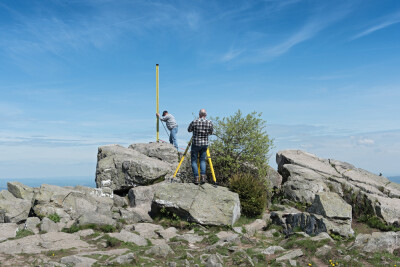Since the Covid-19 pandemic permanently disrupted interdependent worldwide supply chains, costs for steel and other construction materials have been volatile, sometimes dramatically increasing from month to month. With proper scheduling for construction projects never more important, a Canadian-born software company is helping contractors and subcontractors mind ever-shifting materials costs by zeroing in on materials costs and acquisition.
Smartbuild Construction Solutions, a project management software platform/company founded by construction veteran Zulqernain “Zulq” Malik, provides contractors with greater accuracy in tracking materials approval, ordering, manufacturing and delivery.
“The industry has changed and now materials ordering has become more complex. Suppliers and contractors can’t simply have quick calls and expect materials and equipment to arrive on time. They must carefully orchestrate materials approval, ordering, manufacturing and delivery,” Zulq said. “With some projects, missing one of those components could mean no power turned on or other problems.”
And while the architecture, engineering and construction industry now has a plethora of software solutions that manage everything from worker productivity and safety to costs, scheduling and more, it is a traditional industry where old practices are dying slowly. Many contractors are still working partly in the 2D realm while operating in a 3D world by relying on old ways like using Excel and regular email (separate from and not integrated with the project management software), which do nothing to standardize communications and tasks. That lack of standardization means no streamlining and thus, no cost efficiencies can be gained from available technologies.
And though most construction projects are automated through the use of project management software, the technology usually does nothing to keep workers in line. They use the technology they’re required to for the job, but don’t take full advantage of it. They put off some tasks while setting their own schedules and so undercut the streamlining goals of the software they’re using.
Smartbuild is a more rigid, less forgiving platform, on purpose. It allows users less wiggle room to procrastinate to help keep workers on task and on time with scheduling. The platform is basically a virtual construction coordinator that streamlines project work in part by tying completion dates to the platform’s progress. Through forcing worker diligence on tasks, Smartbuild removes inconsistencies from the contractor side of the supply chain.
By firming up completion dates for specific tasks, the platform manages shop drawings approval, and tracks lead times. It also develops onsite dates, checks on the status of materials deliveries, and catalogues history of and communications about equipment. Smartbuild’s Critical Completion Monitor ensures workers stay on top of a variety of tasks. So if a task is ignored or missed by a worker, the platform is effectively stalled. Actions and platform progress go hand in hand.
“If you don’t get a shop drawing approval, the action is not confirmed. Once it is approved, the price is locked,” Zulq said.
Since lack of diligence or outright mistakes by general contractors or subcontractors especially on larger projects can result in costly lawsuits, removing the leeway allowing contractors to make obvious mistakes like tardy materials deliveries means saving money and time. No lawsuits means no lawyer fees and no time wasted on entirely preventable lawsuits.
“Litigation is a product of delays, and that was prevalent even prior to Covid. Any system that enables employees to choose the progress of the shop drawing approval processes is encouraging failure of the project,” Zulq said.
Built by longtime construction professionals with decades of experience including more than $1 billion in completed projects, Smartbuild’s system decreases risk through cataloguing equipment deliveries and other costs that can result in litigation. Zulq devised the software to better manage the staff of his general construction company, BECC Construction Group.
“We built it because I needed to be on top of my team. I needed to streamline processes and to streamline the construction timeline,” Zulq said.
Having begun in the sector as a construction coordinator 27 years ago, he understood the obstacles that can impede a project’s success. In devising his project management software Zulq wanted to address his own pain points, including his need for visibility of actual documentation; to standardize both processes and files; to streamline processes and decrease touch points; and to have accurate documentation and avoid litigation.
Since developing Smartbuild, BECC hasn’t lost any lawsuit.
The platform’s checks and balances help ensure completion of tasks. Being able to easily follow up on deliveries and to check their status with a confirmation is a simple benefit of the software, but rather powerful. Since the average construction site has a combined GC/subcontractor equipment rental rate of about $3,000 daily, cataloguing communications regarding equipment and deliveries of equipment is crucial. Wasted time is wasted money.
“One late piece of equipment impacts everyone,” Zulq said, noting that both the digital age and pandemic created technology disruptions. “Chips and semiconductors are more difficult to get.”
Smartbuild makes it impossible for users to miss or even reschedule deadlines. The Critical Completion Monitor predefines deadlines and other dates, and must be manually overridden in order to change a date.
Most AEC firms can benefit from using Smartbuild. The platform has subscription levels for general contractors, subcontractors and designers. It costs a lot less than others—about $3/hour for small customers.
“You can get an expert project manager in a box for the equivalent of a few dollars an hour,” Zulq said.
But the comments of Smartbuild’s satisfied customers tell something about the software’s effectiveness: The software was designed by someone who has construction experience, many of the platform’s customers have told the company.
The best result for Zulq is hearing how customers are succeeding by using Smartbuild.
“I had the best compliment from a client who said, ‘I actually don’t need a coordinator to manage this project for me. I can do it myself,’” Zulq said.






